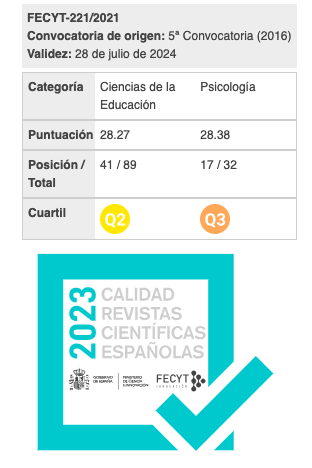Personality and Motivation: Replication, Extension, and Replication
Keywords:
Downloads
Abstract
Previous work examines the relationships between personality traits and intrinsic/extrinsic motivation. We replicate and extend previous work to examine how personality may relate to achievement goals, efficacious beliefs, and mindset about intelligence. Approximately 200 undergraduates responded to the survey with a 150 participants replicating the study two weeks later. When comparing data from the first and second collections, three of the five pathways for personality and achievement goals were replicated: neuroticism, openness, and agreeableness. For personality and efficacy three of the eight pathways remained significant from the first collection to the second. Openness was the only personality factor that significantly predicted participants’ mindset about their intelligence. Results suggest certain personality traits may correspond with different motivational self-beliefs, but these results were neither reliable nor consistent.
Downloads
References
Ames, C. (1992). Classrooms: Goals, structures, and student motivation. Journal of Educational Psychology, 84, 261–271.
Google Scholar CrossrefAriani, D. W. (2013). Personality and learning motivation. European Journal of Business and Management, 5(10), 26-38.
Google Scholar CrossrefBandura, A. (1977). Self-efficacy: Toward a unifying theory of behavioral change. Psychological Review, 84(2), 191-215.
Google Scholar CrossrefBandura, A. (1986). Social foundations of thought and action: A social cognitive theory. Englewood Cliffs, NJ: Prentice-Hall, Inc.
Google Scholar CrossrefBandura, A. (1993). Perceived self-efficacy in cognitive development and functioning. Educational Psychologist, 28(2), 117-148.
Google Scholar CrossrefBandura, A. (1997). Self-efficacy: The exercise of control. New York: W. H. Freeman and Co.
Google Scholar CrossrefBem, D. J., & Allen, A. (1974). On predicting some of the people some of the time: The search for cross-situational consistencies in behavior. Psychological review, 81(6), 506.Blackwell, L. S., Trzesniewski, K. H., & Dweck, C. S. (2007). Implicit theories of intelligence predict achievement across an adolescent transition: A longitudinal study and in intervention. Child Development, 78, 246-263.
Google Scholar CrossrefChen, J. A., & Usher, E. L. (2013). Profiles of the sources of self-efficacy. Learning and Individual Differences, 24, 11-21.
Google Scholar CrossrefChiu, C.Y., Hong, Y.Y., & Dweck, C. S. (1997). Lay dispositionism and implicit theories of personality. Journal of Personality and Social Psychology, 73, 19-30.
Google Scholar CrossrefCiani, K. D., Summers, J. J., & Easter, M. A. (2008). A “top-down” analysis of high school teacher motivation. Contemporary Educational Psychology, 33, 533-560.
Google Scholar CrossrefCiani, K. D., Middleton, M. J., Summers, J. J., & Sheldon, K. M. (2010). Buffering against performance classroom goal structures: The importance of autonomy support and classroom community. Contemporary Educational Psychology, 35, 88-99.
Google Scholar CrossrefClark, M. H., & Schroth, C. A. (2010). Examining relationships between academic motivation and personality among college students. Learning and Individual Differences, 20, 19-24.
Google Scholar CrossrefCosta, P. T., Jr., & McCrae, R. R. (1985). The NEO personality inventory manual. Odessa, FL: Psychological Assessment Resources.
Google Scholar CrossrefDe Feyter, T., Caers, R., Vigna, C., & Berings, D. (2012). Unraveling the impact of the big five personality traits on academic performance: The moderating and mediating effects of self-efficacy and academic motivation. Learning and Individual Differences, 22, 439-448.
Google Scholar CrossrefDeci, E. L., & Ryan, R. M. (1985). The general causality orientations scale: Self-determination in personality. Journal of research in personality, 19(2), 109-134.
Google Scholar CrossrefDweck, C. S. (1999). Self-theories: Their role in motivation, personality, and development. Philadelphia: Psychology Press.
Google Scholar CrossrefDweck, C. S. (2006). Mindset: The new psychology of success. New York: Random House.
Google Scholar CrossrefDweck, C. S. (2012). Mindsets and human nature: Promoting change in the Middle East, the schoolyard, the racial divide, and willpower. American Psychologist, 67(8), 614-622.
Google Scholar CrossrefDweck, C. S., & Molden, D. C. (2005). Self-theories: Their impact on competence motivation and acquisition. In A. J. Elliot & C. S. Dweck (Eds). Handbook of competence and motivation (pp. 122- 140). New York, NY: The Guilford Press.
Google Scholar CrossrefElliot, A. J. (1999). Approach and avoidance motivation and achievement goals. Educational Psychologist, 34, 169–189.
Google Scholar CrossrefElliot, A. J., & McGregor, H. A. (2001). A 2 × 2 achievement goal framework. Journal of Personality and Social Psychology, 80, 501–519.
Google Scholar CrossrefFives, H., & Buehl, M. M. (2010). Examining the factor structure of the teachers’ sense of efficacy scale. The Journal of Experimental Education, 78, 118-134.
Google Scholar CrossrefFinney, S. J., Pieper, S., & Barron, K. (2004). Examining the psychometric properties of the Achievement Goal Questionnaire in a general academic context. Educational and Psychological Measurement, 64(2), 365–382.
Google Scholar CrossrefFiske, S. T. (2008). Core social motivations: Views from the couch, consciousness, classroom, computers, and collectives. In J. Y. Shah & W. L. Gardner (Eds). Handbook of motivation science (pp. 3-22). New York, NY: The Guilford Press.
Google Scholar CrossrefFurnham, A., Chamorro-Premuzic, T., & McDougall, F. (2003). Personality, cognitive ability, and beliefs about intelligence as predictors of academic performance. Learning and Individual Differences, (14), 49-66.
Google Scholar CrossrefHazrati-Viari, A., Rad, A. T., & Torabi, S. S. (2012). The effect of personality traits on academic performance: The mediating role of academic motivation. Procedia - Social and Behavioral Sciences, 32, 367-371.
Google Scholar CrossrefHeaven, P. C. L. (1990). Attitudinal and personality correlates of achievement motivation among high school students. Personality and Individual Differences, 11(7), 705-710.
Google Scholar CrossrefHolzberger, D., Philipp, A., & Kunter, M. (2013). How teachers’ self-efficacy is related to instructional quality: A longitudinal analysis. Journal of Educational Psychology, 105(3), 774-786.
Google Scholar CrossrefHuang, C. (2011). Achievement goals and achievement emotions: A meta-analysis. Educational Psychology Review, 23(3), 359-388.
Google Scholar CrossrefHuang, C. (2012). Discriminant and criterion-related validity of achievement goals in predicting academic achievement: A meta-analysis. Journal of Educational Psychology, 104(1), 48-73.
Google Scholar CrossrefHulleman, C. S., Schrager, S. M., Bodmann, S. M., & Harackiewicz. (2010). A meta-analytic review of achievement goal measures: Different labels for the same constructs or different constructs with similar labels? Psychological Bulletin, 136(3), 422-449.
Google Scholar CrossrefJudge, T. A., Higgins, C. A., Thoresen, C. J., & Barrick, M. R. (1999). The big fiver personality traits, general mental ability, and career success across the life span. Personnel Psychology, 52(3), 621-652.
Google Scholar CrossrefKlassen, R. M., Tze, V. M. C., Betts, S. M., Gordon, K. A. (2011). Teacher efficacy research 1998-2009: Signs of progress or unfulfilled promise? Educational Psychology Review, 23, 21-43.
Google Scholar CrossrefKomarraju, M., & Karua, S. (2005). The relationship between the big five personality traits and academic motivation. Personality and Individual Differences, 39, 557-567.
Google Scholar CrossrefKomarraju, M., Karua, S. J., & Schmeck, R. R. (2009). Role of the big five personality traits in predicting college students' academic motivation and achievement. Learning and Individual Differences, 19, 47-52.
Google Scholar CrossrefLittle, T. D., & Wanner, B. (1996). The Little big five-C: A behavioral inventory for children. Technical report, Max Planck Institute for Human Development and Education, Berlin, Germany.
Google Scholar CrossrefMatthews, G., Zeidner, M., & Roberts, R. D. (2006). Models of personality and affect for education: A review and synthesis. In P. A. Alexander & P. H. Winne (Eds). Handbook of educational psychology (pp. 163-186). Mahwah, NJ: Lawrence Erlbaum Associates, Inc.
Google Scholar CrossrefCosta, P. J., & McCrae, R. R. (1995). Domains and facets: Hierarchical personality assessment using the revised NEO personality inventory. Journal of Personality Assessment, 64, 21-50.
Google Scholar CrossrefMidgley, C., Feldlaufer, H., & Eccles, J. S. (1989). Change in teacher efficacy and student self and task-related beliefs in mathematics during the transition to junior high school. Journal of Educational Psychology, 81(2), 247-258.
Google Scholar CrossrefMidgley, C., Kaplan, A., Middleton, M., Maehr, M. L., Urdan, T., Anderman, L. H., Anderman, E., & Roeser, R. (1998). The development and validation of scales assessing students’ achievement goal orientations. Contemporary Educational Psychology, 23, 113-131.
Google Scholar CrossrefMidgley, C., Maehr, M. L., Hruda, L. Z., Anderman, E., Anderman, L., Freeman, K. E., et al. (2000). Manual for the Patterns of Adaptive Learning Scales (PALS). Ann Arbor, MI: University of Michigan.
Google Scholar CrossrefPatrick, H., Hicks, L., & Ryan, A. M. (1997). Relations of perceived social efficacy and social goal pursuit to self-efficacy for academic work. Journal of Early Adolescence, 17, 109-128.
Google Scholar CrossrefPintrich, P. R. (2000). An achievement goal theory perspective on issues in motivation terminology, theory, and research. Contemporary Educational Psychology, 25, 92–104.
Google Scholar CrossrefPintrich, P. R. (2003). A motivational science perspective on the role of student motivation in learning and teaching contexts. Journal of Educational Psychology, 95(4), 667-686.
Google Scholar CrossrefRyan, A. M., Gheen, M. H., & Midgley, C. (1998). Why do some students avoid asking for help? An examination of the interplay among students’ academic efficacy, teachers’ social-emotional role, and the classroom goal structure. Journal of Educational Psychology, 90, 528-535.
Google Scholar CrossrefRyan, R. M., & Deci, E. L. (2000). Intrinsic and extrinsic motivations: Classic definitions and new directions. Contemporary Educational Psychology, 25, 54-67.
Google Scholar CrossrefSenko, C., Hulleman, C. S., Harackiewicz, J. M. (2011). Achievement goal theory at the crossroads: Old controversies, current challenges, and new directions. Educational Psychologist, 46(1), 26-47.
Google Scholar CrossrefSkallvik, E. M., & Skaalvik, S. (2007). Dimensions of teacher self-efficacy and relations with strain factors, perceived collective teacher efficacy, and teacher burnout. Journal of Educational Psychology, 99(3), 611-625.
Google Scholar CrossrefTschannen-Moran, M., Woolfolk-Hoy, A., & Hoy, W. K. (1998). Teacher efficacy: Its meaning and measure. Review of Educational Research, 68(2), 202-248.
Google Scholar CrossrefTschannen-Moran, M., &Woolfolk-Hoy, A. (2001). Teacher-efficacy: Capturing an elusive construct. Teaching and Teacher Education, 17, 783–805.
Google Scholar CrossrefUsher, E. L. (2009). Sources of middle school students’ self-efficacy in mathematics: A qualitative investigation. American Educational Research Journal, 46, 275-314.
Google Scholar CrossrefWatanabe, S., & Kanazawa, Y. (2009). A test of personality-based view of intrinsic motivation. Japanese Journal of Administrative Science, 22(2), 117-130.
Google Scholar CrossrefWeiner, B. (1990). History of motivational research in education. Journal of Educational Psychology, 82(4), 616-622.
Google Scholar CrossrefYeager, D. S., & Dweck, C. S. (2012). Mindsets that promote resilience: When students believe that personal characteristics can be developed. Educational Psychologist, 47(4), 302-314.
Google Scholar CrossrefDownloads
Published
Almetric
Dimensions
How to Cite
Issue
Section
License
All articles are published under Creative Commons copyright (CC BY). Authors hold the copyright and retain publishing rights without restrictions, but authors allow anyone to download, reuse, reprint, modify, distribute, and/or copy articles as the original source is cited.
















